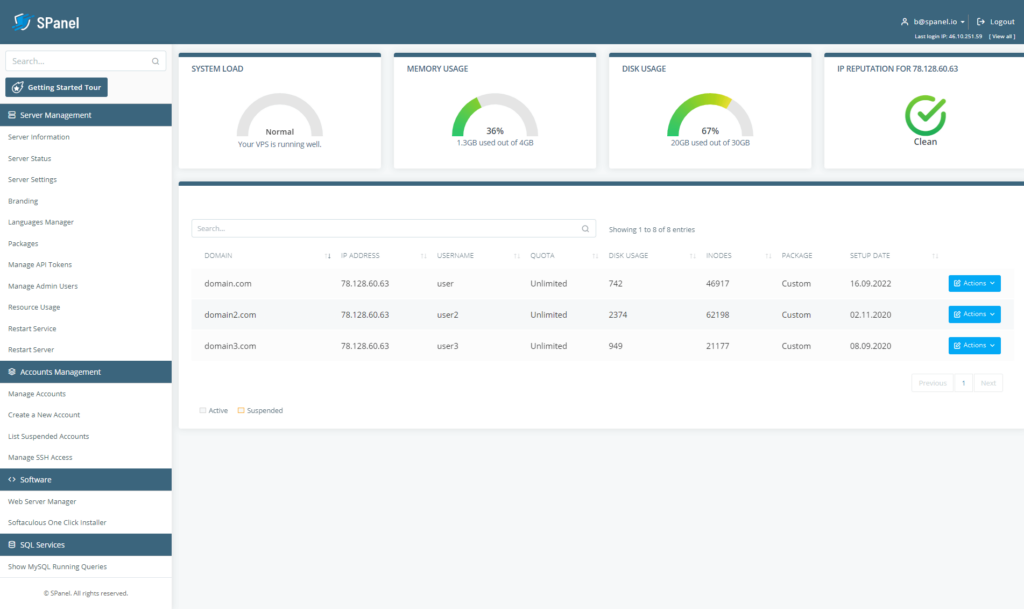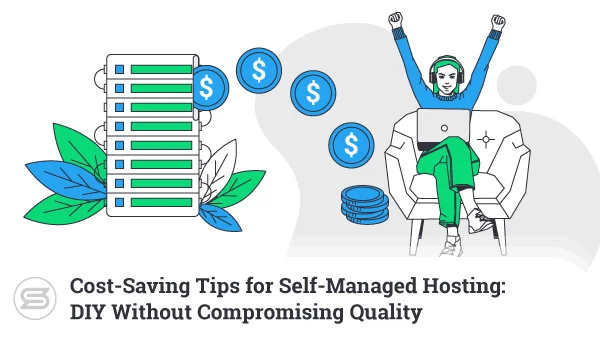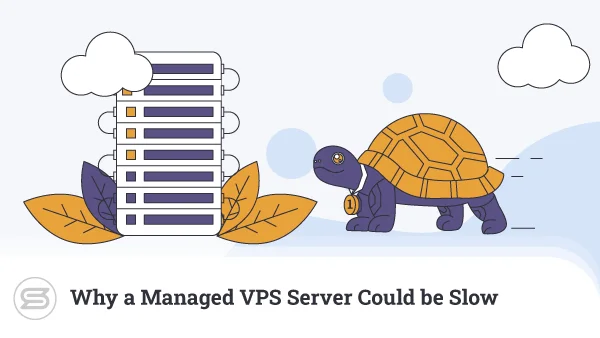Web hosting comes in several different forms – from shared hosting for small projects to dedicated server hosting reserved primarily for enterprise users. There’s also VPS, or Virtual Private Server hosting – a relatively new type of service that is considered by many to be the best all-round solution.
Given the wide range of prices this category falls within, there may be some confusion about what exactly you can do with these plans.
This article will dive deeper into the world of VPS hosting and examine some of its most popular use cases.
What is a VPS?
Before we explore the most common VPS use cases, we first need to discuss how virtual servers work and how they compare to the other services on the market.
When you pay your hosting fee, you effectively rent hardware resources from your host. What these resources are and how they’re delivered differ between the individual types of hosting.
If you use a shared hosting plan, you share the same physical server with hundreds of other users. The hardware resources are available on a first-come, first-served basis, so if the server is under too much load, your project may not have the power to run smoothly.
This isn’t ideal, but on the flip side, situating so many people on the same server helps hosting providers keep the price down, and shared plans usually start at just a few dollars per month.
At the other end of the scale, you have dedicated servers. You effectively have an entire physical machine all to yourself. All its hardware resources are reserved for your project only and are available to you 24/7.
A dedicated server is much more powerful than a shared account, but it’s also much more expensive, with most good plans starting at over $100 per month.
Now that we’ve seen how traditional hosting services work, let’s see how a VPS stacks up. The following video sums it up pretty well.
What is a VPS – Everything you need to know!
Using virtualization technology, the hosting provider creates a large network of physical machines called a cloud. Within the cloud, it then deploys virtual instances that work independently from each other.
Every VPS has its own hardware configuration, operating system, and IP address. In other words, from a user’s perspective, it is pretty similar to a dedicated server – you have a completely isolated environment and a predetermined set of hardware resources available all the time.
You don’t have to worry about anyone else compromising the server’s performance or its IP’s reputation. This means more consistent speed, better security, and no email deliverability issues.
This sounds good, but how does it differ from the top-of-the-range dedicated server? And how is it beneficial to your business in the long run?
How Can a VPS Help Your Business?
If you run a company that operates online, a shared account can never sustain your business in the long run. However, a dedicated server doesn’t sound like a terribly appealing alternative, either.
Every dedicated server has a hardware configuration that can’t be changed easily. When you rent a dedicated machine, you’ll get the resources that come with it, regardless of whether you need all of them.
In other words, you may be using only 30% of the server’s potential, but you’ll be paying for the full package. Not the most cost-effective solution, you have to agree.
With a VPS, this isn’t a problem. For one, the virtualization layer lets providers distribute processing power more efficiently, creating solutions suitable for projects of all shapes and sizes.
Furthermore, a VPS’s hardware configuration is completely customizable.
For example, when setting up your new ScalaHosting VPS, you have a choice of a few preset plans, but you can also specify the exact amount of memory, storage space, and the number of CPU cores you’ll get with it.
As your site’s requirements grow, you can easily add more resources.
Upgrading to a more powerful VPS solution doesn’t mean deploying an all-new instance and moving your website to it. You can usually do it via the Client Area on your host’s website, and it rarely requires anything more than a reboot of the virtual machine.
You’ll have no problems growing, either. Cloud VPS solutions are powered by enormous clusters of physical machines, so no matter how big or popular your project gets, your server will always be able to meet your demands.
VPS Use Cases
If you’re wondering what you can use VPS hosting for, the answers might be surprising. Remember that a VPS is, for all intents and purposes, an entire server. It has a fully-fledged operating system with pretty much all the options of a regular, physical machine.
This means that you can use it for anything you want. Here are some of the use cases.
Website Hosting
One of the most common roles of a VPS is as a web hosting server. What technologies are supported depends on the virtual server, its operating system, and the virtualization technology. However, most VPS solutions can work with popular web development languages (e.g., PHP), database management systems (like MySQL), and the protocols that make websites accessible worldwide, so they’re a perfectly suitable web hosting solution.
There are several options for managing a website on a VPS. Your virtual server supports communication protocols like SSH and FTP that help you tweak the server’s settings and upload and edit files, folders, and databases. However, many prefer to do all these things via a web hosting control panel.
Here, for example, is how you can control your projects if you use the SPanel management platform.The process begins with deploying the VPS. Our technicians will install SPanel on the server, and you will receive a welcome email with the steps for creating your first admin account. With the account created, you can log into SPanel’s Admin Interface.

At the top of the Admin Interface’s homepage, you have graphs showing you how high the load is at any given time. The tools that let you control your VPS can be divided into two groups – those concerning server management and those dealing with account management.
The server management tools let you do things like changing SPanel’s display language, restarting individual services, and changing the web server setup.
The other options in the Admin Interface are related to the accounts for the individual projects on your server. You can set up multiple accounts and host as many websites as you want on each one.
It’s up to you to determine who has access to these accounts and what they can do. You can also set limits on individual accounts as well as suspend or delete them.Every account has its own login credentials, granting access to SPanel’s User Interface.

There, you can control every single aspect of a regular website. For example, if you want to use a CMS, you can have Softaculous install your web application of choice automatically, so you can start work on your site right away. All you need to do is specify the installation folder and pick a password for the backend.
It’s a good idea to install an SSL certificate next. SPanel will attempt to set up a free Let’s Encrypt certificate on your account if your domain is resolving correctly. If it’s not, SPanel’s User Interface has a tool for installing it manually. Additional domain-related settings can also be tweaked via the User Interface.
There’s an editor for the DNS records and tools for creating and managing subdomains, addon domains, and redirects. You can set up FTP accounts to manage your files, and the phpMyAdmin tool helps you take care of your databases. Last but not least, you have everything you need to set up and control all your email inboxes.
All this and more is wrapped in an intuitive graphical user interface.
Check out the video below to learn more about SPanel.
SPanel — The All-in-One Cloud Hosting Management Platform
An Application Server
An application server holds information that is crucial for the operation of a mobile, desktop, or web program. It also hosts the software responsible for serving this information through a predetermined set of communication protocols.
Many of the applications we use every day rely on the cloud to run, so a VPS is perfect for them. The software you install on your virtual machine depends on your project, and because you can have your VPS with pretty much any operating system you want, you’re bound to find a solution that fits your needs.
A Gaming Server
A good game server has two primary characteristics.
First, it has to be powerful. If it’s going to support multiple people playing simultaneously, it’ll need plenty of processing power and memory. And as we established already, a cloud VPS can be as powerful as you want it to be.
What’s more, because of its incredible scalability, you can start small and add additional resources whenever they’re needed. The hardware configuration can be changed in minutes, so you can react even in the event of an unexpected influx of new players.
The second thing a game server needs is a high-speed, stable internet connection. In theory, any computer can act as a game server. However, without proper connectivity, all players will get some frustrating lag.
The hardware powering your VPS is situated in state-of-the-art data centers equipped with enterprise-grade internet connectivity. Uptime is crucial for data centers, so they employ high-speed connections with built-in redundancy that guarantees data between your server and the internet is transferred quickly and reliably.
A properly set up game server can be an excellent source of income. You can set up a subscription service, make money through ads, or sell virtual goods. You just need to pick a popular game. And they don’t get much more popular than Minecraft.
Running your own Minecraft server can be a lucrative business, and to help you build it, we created VPS plans specifically designed for one of the world’s top video games.
The virtual servers are deployed on infrastructure run by AWS, so your service will be powered by one of the top cloud companies in the world. You get a few tools integrated into the SPanel management platform that comes pre-installed on your VPS, meaning you can get your server up and running in no time.
There are several plans to choose from, all with different hardware configurations and bandwidth limitations, so we have a solution for you, no matter how popular your server is.
An Email Server
Email communication has been an integral part of the corporate world for decades, and this is unlikely to change soon. Most hosting plans available on the market, even the cheapest ones, offer an email service integrated into the package. However, if emails are essential to you, you’ll find a lot of sense in renting a VPS just for your incoming and outgoing communication.
The main advantage is the dedicated IP. You won’t share the address, so you don’t need to worry about anyone else sending spam and blacklisting it. You have more storage space to devote to your emails alone, and separating the email accounts from your website may help you quickly recover your communication if something goes wrong.
There are other benefits if you choose an SPanel VPS for your email hosting. On the homepage of SPanel’s Admin Interface, you have a widget that monitors your IP’s reputation. It periodically checks five of the world’s most popular spam blacklists, and if it finds your address in one of them, it will alert you immediately.
In addition, our VPS solutions come with robust spam protection and daily offsite backups that help you ensure data losses will be kept to a minimum in case the worst happens.
A VPN Server
Virtual Private Networks, or VPNs, have a wide range of applications. Consumers usually use VPN solutions for everything from bypassing geolocation blocks to increasing online privacy. However, VPN plays an even more critical role in business use – hardening data security. One of the most attractive characteristics of virtual private networks is the encryption tunnel they use to transport data.
The internet is full of various free and premium VPN providers. However, due to monetary and privacy concerns, quite a few people prefer to set up their VPN servers themselves. A VPS gives those users a number of advantages.
For one, virtual servers support the protocols that encrypt the data exchange and secure the virtual private network. You can install and configure your VPN solution to your exact requirements and specify the hardware configuration according to the load and number of people using the network.
Your VPS is online 24/7, and it’s powered by the high-speed internet connection provided by the data center. As a result, your VPN will be accessible anytime, anywhere, and it won’t frustrate users with slow downloading speeds.
A VoIP Server
Similar to emails, a Voice Over Internet Protocol (or VoIP) service can be an essential means of communication for your online business. It can reduce costs tremendously, especially if you travel a lot. Still, VoIP services aren’t exactly cheap, and if you make a lot of calls, it may be more cost-effective to implement a VoIP solution directly on your VPS.
You often get a choice of operating systems with a VPS, so you can pick between a broad range of supported VoIP providers. The broadband internet connection will keep your telephony service online all the time and ensure the calls are loud and clear.
Aside from all this, setting up your VoIP service on your VPS allows for greater customization. You only need to implement the necessary features and set up the initial phone configuration. The result is often a lighter, more efficient option for corporate communications.
A Backup Server
Quite a few developers have found out to their own cost that poor backup management can cause enormous headaches. If you want to avoid these headaches, you may want to think about how you store your backups.
There’s no point in keeping them on your production server. On the one hand, they take up valuable storage space, and on the other, they will be damaged if the main server suffers catastrophic failure.
Storing backups on external hard drives or personal computers isn’t the best strategy, either. Hardware failure can cause data loss, and even if it doesn’t, when the time comes to restore data from the backup, you’ll first need to upload it, which takes time, potentially extending the outage. Ideally, you’ll keep your backup on a remote server, and it makes a lot of sense to use a virtual rather than a physical machine.
For one, you have more flexibility. If you use a VPS as a backup server, you won’t need that much RAM or processing power. However, as your backups grow larger, the demand for storage space will increase, and a properly configured VPS solution is much better equipped at satisfying it than a physical machine.
This means that it’s a more cost-effective solution, as well. You won’t be paying for dozens of CPU cores or lots of memory, so you won’t need to shell out for an expensive solution.
And because the virtual server is supported by a modern data center, you can rely on an enterprise-grade connection to download the data to your production environment and restore it.
A Database Server
Most developers use the same server for the website’s files and databases. This is a stable setup for many projects, but sometimes, higher traffic volumes or the requirement for some customization may mean that hosting your databases on a separate server is the better call.
Once again, picking a VPS for this purpose makes a great deal of sense. You can specify the hardware configuration and change it according to your requirements. If you have root access, you can install any database management system you want, and if you use a reputable VPS provider, connectivity problems shouldn’t be a concern. Configuring your web application to work with the new server is usually a matter of editing the main configuration file.
A Forex VPS
To those not well acquainted with the world of Forex trading, the idea of using a VPS to trade foreign currencies may seem a bit odd. However, once you understand how Forex works, you’ll see that it makes a lot of sense.
For one, Forex markets don’t sleep, and if you are serious about your trading, you need to make sure you’re present 24/7. This is impossible if you’re executing your trades yourself, which is why you now have automatic trading applications (called trading robots) that can work nonstop and use complex algorithms to build and run a strategy that maximizes your profits.
You can install these applications on a regular computer, but if you want good results, you’ll probably prefer another solution. For one, any other software running on your home machine is likely to put additional load on the hardware, potentially compromising its performance.
Every second counts on the Forex market, and any delays in placing or executing a trade could be costly, so unless you’re willing to use an entire PC for trading only, you can expect some slip-ups. Furthermore, your internet connection at home may also cause delays, especially if your requests need to travel halfway across the globe.
A VPS presents a solution to all the problems of using a home PC for your Forex trades. First, your provider puts a lot of effort into ensuring your VPS is always online, so your trading robots can work around the clock.
You can also be sure the trades will be placed without any delays. For one, most providers use multiple data centers spread all over the world, so you can deploy it in a location close to one of the main Forex trading hubs, reducing latency dramatically.
You can also rely on the enterprise-grade connection of the data center. It’s much faster than what you have at home, and providers try to keep outages to a minimum. All this lets your trading robots execute their strategy more precisely, hopefully resulting in larger profits.
How To Pick The Right VPS Host?
A VPS will only give you all the benefits we discussed above if you pick the right one. Doing it may be trickier than it sounds. There are quite a few things to consider, all of which are crucial if you want a high-quality service suitable for your project.
Here’s a list of things you should go through when choosing a VPS:
- Managed vs. Unmanaged VPS – There are two types of VPS service. If you want a VPS service pre-configured for website hosting, you’re better off picking a managed service. With it, the host deploys the virtual server and installs every tool you need to launch and develop your project.
These tools usually come in the form of a web hosting control panel – a GUI-based management platform that helps you control your server’s projects without memorizing complex commands. In addition, your host’s technicians are also responsible for complex sysadmin tasks like installing and configuring updates, setting up firewall rules, etc.
A managed server is the perfect solution for a standard website, but if your project needs a custom environment or uses technology that isn’t that widespread a self-managed (or unmanaged) VPS would be the better choice. With it, your host deploys the server and leaves it to you to install and configure everything you need to get your project on the road.
You will be in charge of setting up and securing everything, meaning this solution is more suitable for experienced users who know how to configure a server. However, because you have so much freedom, you can use your VPS for a much broader range of purposes.
- Hardware resources – Upgrading a VPS is usually as easy as clicking a couple of buttons, so even if your server is not up to the job, you can easily get the resources you need and secure better loading speeds. That being said, if you want to impress users from the off, you should ensure your VPS comes with the correct initial hardware configuration. If you’re not sure what you need, you can discuss your project with your host’s support experts, who should have the answers you’re looking for.
Consider the long-term prospects. If you’re starting a brand new project, you’ll initially want a cheaper solution with limited resources. However, you have to make sure that your VPS is scalable enough to support your business’s growth.
- Price – Many factors affect the cost of your virtual private server, including whether or not the service is fully managed, the operating system, the hardware configuration, etc.
That’s why some virtual servers cost a little over $10 per month while others run well into the three-figure range. That said, every host has its own pricing policy, so make sure you compare similarly-speced solutions offered by different providers and see which one gives you the best deal.
Bear in mind that this shouldn’t be the main criterion. Sometimes, a VPS is cheap for a reason, so don’t base your decision solely on the financial aspect. However, try to ensure you’re not overpaying for the service.
- Operating system and supported software – You must ensure your virtual server is compatible with the applications you want to install and run. In addition to choosing the right operating system, you must go through your project’s system requirements and check whether everything is supported.
- Customer Support – Customer support is important, regardless of the hosting service. You want to be sure that the people in charge of deploying and maintaining the infrastructure supporting your VPS know what they’re doing. You’ll also want to be able to rely on them if you ever need assistance with your server.
Look for a VPS host that offers a broad spectrum of support channels. 24/7 availability is an absolute must, but it will amount to nothing if the response times aren’t good enough. A pre-sales chat may give you an idea of how quick a provider’s support agents are, though it also pays to do some research online and see which companies have built a reputation for efficient, knowledgeable technicians and customer service specialists.
- Innovation – While technology is a relatively even playing field, some hosting providers go the extra mile and build useful tools that improve the service’s overall quality.
For example, ScalaHosting has developed SPanel, an advanced web hosting control panel that is available on our managed VPS plans completely free of charge. In the context of rising licensing fees for control panels, an in-house-built management platform lets our customers enjoy a smooth user experience at a fair price.
- Security – Although VPS plans are inherently more secure, you have to consider the hosting provider’s overall setup. Ask the host about the measures it has taken to keep your virtual server safe and see if there are any specific tools that can improve your chances of fending off the ever-increasing range of threats.
- Reliability and Reputation – It can be challenging to judge the quality of a hosting provider through technical specifications alone.
Instead, look towards well-known public platforms like TrustPilot to see what your peers say about the service. While some reviews are paid or written by affiliates, you can get a good general picture of what to expect from a host.


ScalaHosting Managed and Unmanaged VPS
At ScalaHosting, we want to make sure our solutions are suitable for as many different kinds of projects as possible, which is why we offer VPS hosting plans that range from novice-friendly managed virtual servers optimized for web hosting to highly customizable self-managed machines that give you complete freedom to build and develop your project.
Our managed solutions are based on Linux and are perfect for hosting almost any website. In addition to the easily scalable environment that supports your growth in the long run, they also give you all the tools you need to build and maintain your projects.
As we mentioned already, these tools are incorporated into a web hosting control panel. At ScalaHosting, you can choose between two panels – WHM/cPanel or SPanel.
WHM/cPanel has been on the market since 1996, and it’s by far the most popular server and account management platform. It has everything you need to build a successful website, and people still love it. However, in the wake of a few recent licensing fee hikes, many users have been looking for an alternative.
SPanel is one such alternative. It’s an all-in-one management platform developed by ScalaHosting and optimized for VPS web hosting. We’ve been working on it for years, and we’ve already included the tools required for installing CMS applications, creating email and FTP accounts, managing databases, domains, subdomains, and many more.
However, we know that if it is to compete with other products on the market, it has to evolve and receive even more new features and functionalities regularly. And the best people to determine which features need to be added next are those who work with it every day.
That’s why we have a feature request platform where SPanel users can suggest and vote for the functionality they want to see in the next update. We keep a close eye on it and always prioritize the most demanded features.
We also take care of the complex sysadmin tasks on your managed VPS, like updating critical components, implementing firewall rules, and configuring the operating system for the best possible performance and security. Thanks to all this, you can focus on developing your website without worrying about its loading speeds or safety.
On the other hand, if your project requires a custom environment, you can always opt for one of our unmanaged VPS solutions.
They are deployed on the same cloud infrastructure as the managed VPSs, so you have the same reliable environment and scalable base to build your project on. You can configure your VPS’s hardware configuration to your own specifications, and you also get to pick the operating system. In addition to a range of Linux distributions, your virtual machine can also run on Windows.
You get root/administrator access, so you can install everything you need and configure it just the way you want it.
Want to learn more about our VPS services? We can help!
Book your free consultation here and get a gift – free SPanel for three months on your VPS.
Conclusion
Versatility is just one of the many advantages of a VPS. You have an entire machine all to yourself, and its usage isn’t limited to website hosting. Not only that – in many cases, the virtualization layer, dedicated resources, and isolated environment make your virtual server superior to the established alternatives.
FAQ
Q: What is VPS hosting used for?
A: You can use VPS hosting for many purposes. However, the nature of virtual servers means they are best employed when greater reliability, performance, and security are necessary. Examples of possible VPS hosting use are – web hosting, email hosting, and web application hosting.
Q: Why is VPS better than shared hosting?
A: One critical advantage VPS hosting has over shared services is that you benefit from dedicated resources. The anytime-availability of resources leads to faster and more reliable performance. Besides, the isolated nature of VPS accounts also leads to better security.
Q: How do I manage VPS hosting?
A: You can manage VPS hosting in various ways, such as via the interface provided by your web host. Another way, often employed by more experienced users, is the command line where you directly operate the server via web code. The options initially available will depend on the host you choose.



